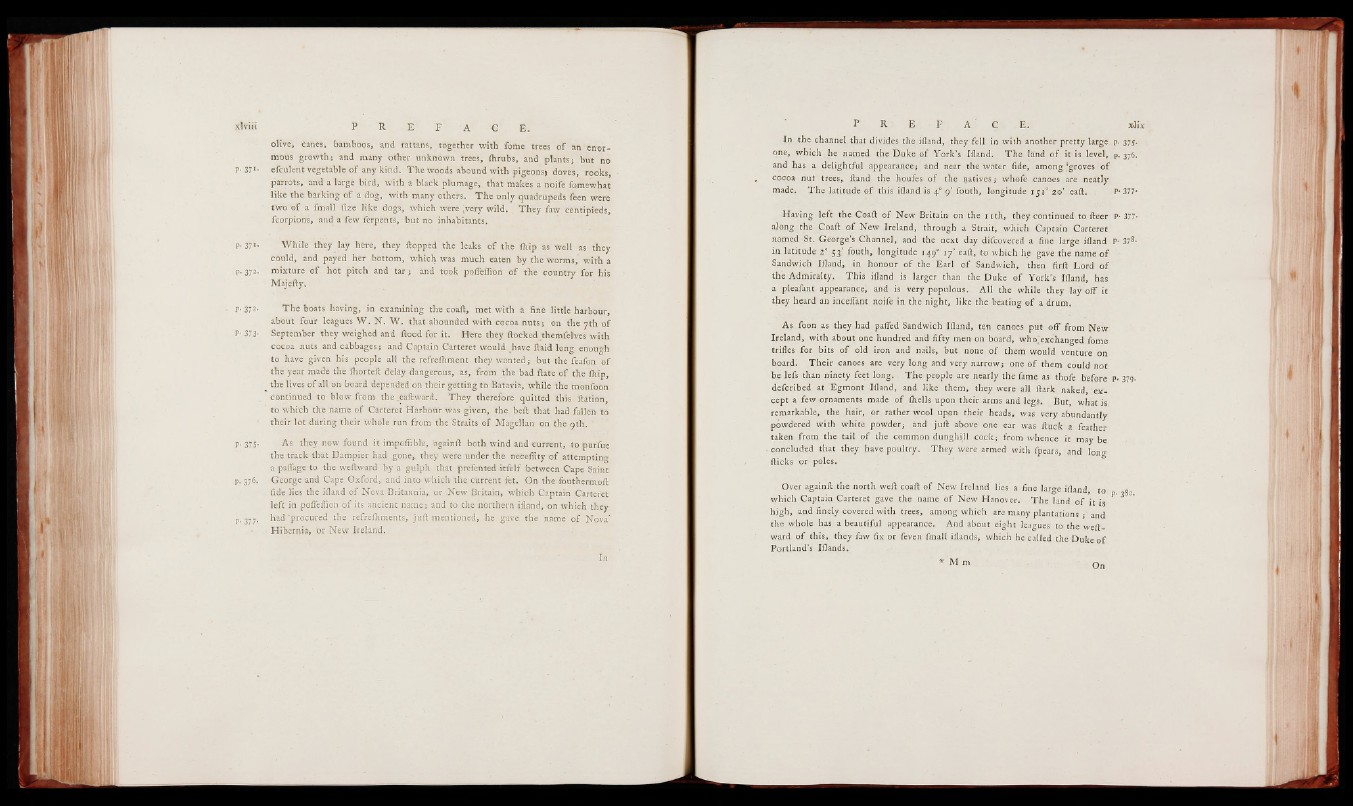
xïviii
P-371-
P' 37*-
P* 372-
P- 372,
P- 373-
P- 375*
P- 376*
P- 377-
olive, éafrès, batnbôos, and rattans, together with fome trees of an enormous
growth ; and many other Unknown trees, fhrubs, and plants; but no
efculent vegetable of any kind. The woods abound with pigeons* doves, rooks
parrots, and a large bird, with a black plumage, that makes a noife fomewhat
like the barking of à dog, with many others. The only quadrupeds feen were
two of a fínall fize like dogs, which were ¡very Wild. They faw centipitds,
fcorpiofls, and a few ferpents, but no inhabitants.
While they lay here, they flopped the leaks of the fhip as well as they
could, and payed her bottom, which was much eaten by the worms, with a
mixture o f hot pitch and tar j and took poífeííiOn of the country For his
Majefty.
The boats having, in examining the coaft, met with a fine little harbour,
about four leagues W. N. W. that abounded with cocoa nuts'; on the 7th of
September they Weighed and flood for it. Here they flocked themfelves with
cocoa nuts and cabbages ; and Captain Carteret would thave ftaid long enough
to have given his people all the refrefhment they wanted; but the feafon of
the year made thé fhô’rteft delay dangerous, as, from the bad Hate of the fhip,
the lives of all on board depended on their getting to Batavia, while the monfuon .
continued to blow from the _êaftWard. They therefore quitted this ftatíoñ
to which thé name of Carteret Har-bOur Was given, the beft that had fallen tô
their lot during their whole run from the Straits of Magellan on the 9th.
As they now found it impofiible, again ft both wind and current, to purfue
the track that Dampier had gone, they were under the necefiity of attempting
a paftage to the weftward by a gulph that prefented itfelf between Cape Saint
George and Cape Oxford, and into which the cur rent fet. On the fouthermoft
fide lies the ifland of Nova Britannia; or New Britain, which Captain Carteret
left in poffeffion of its ancient name; and to the nórthern ifland, on which they
had 'procured the refreihmehts, ‘juft mentioned, he gave the name of Nova*
Hibernia, :or New Ireland.
I k
In the channel that divides the ifland, they fell in with another pretty large p. 375.
one, which he named the Duke of York’s Ifland. The land of it is level, p. 376.
and has a delightful appearance; and near the water fide, among ¡’groves of
cocoa nut trees, ftand the houfes of the natives; whofe canoes are neatly
made. The latitude of this ifland is 40 9’ fouth, longitude 1510 20’ eaft. P* 377-
Having left the Coaft of New Britain on the 11 th, they continued to fteer P* 377*
along the Coaft of New Ireland, through a Strait, which Captain Carteret
named St. George’s Channel, and the next day difcovered a fine large ifland P* 378*
in latitude 20 53’ fouth, longitude 1490 17’ eaft, to which he gave the name of
Sandwich Ifland, in honour of the Earl of Sandwich, then firft Lord of
the Admiralty. This ifland is larger than the Duke of York’s Ifland, has
a pleafant appearance, and is very populous. All the while they lay off it
they heard an inceffant noife in the night, like the beating of a drum.
As foon as they had paffed Sandwich Ifland, ten canoes put off from New
Ireland, with about one hundred and fifty men on board, who^ exchanged fome
trifles for bits of old iron and nails, but none of them would venture on
board. Their canoes are very long and very narrow; one of them could not
be lefs than ninety feet long. The people, are nearly the fame as thofe before p. 379.
defcribed at Egmont Ifland, and like them, they were all ftark naked except
a few ornaments made of fhells upon their arms and legs. But, what is
remarkable, the hair, or rather wool up,on their heads, was very abundantly
powdered with white powder; and juft above one ear was ftuck a feather
taken from the tail of the common dunghill cock; from whence it may be
concluded that they have poultry. They were armed with fpears, and long
flicks or poles.
Over againft,the north weft coaft of New Ireland lies a fine large ifland, to p go
which Captain Carteret gave the name of New Hanover. The land of it is
high, and finely covered with trees, among which are many plantations ; and
the whole has a beautiful appearance. And about eight leagues to the weftward
of this, they faw fix or feven fmall iflands, which he called the Duke of
Portland’s Jflands.
*M m . On